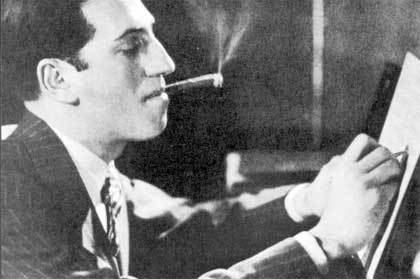
Born Jacob Gershvin on September 26, 1898, in Brooklyn, New York, he died on July 11, 1937, in Hollywood, California. He was one of the most significant and popular American composers of all time. Gershwin wrote primarily for the Broadway musical theatre, but important as well are his orchestral and piano compositions in which he blended, in varying degrees, the techniques and forms of classical music with the stylistic nuances and techniques of popular music and jazz.
Best known as George Gershwin, he devoted himself to both popular songs and fabulous orchestral compositions. His Broadway shows from the 1920s and ’30s featured numerous songs that became standards: “Fascinating Rhythm,” “Oh, Lady Be Good,” “Sweet and Low-Down,” “Do, Do, Do,” “Someone to Watch over Me,” “Strike Up the Band,” “The Man I Love,” “’S Wonderful,” “I’ve Got a Crush on You,” “Bidin’ My Time,” “Embraceable You,” “But Not for Me,” “Of Thee I Sing,” and “Isn’t It a Pity.”
He also composed several songs for Hollywood films, such as “Let’s Call the Whole Thing Off,” “They All Laughed,” “They Can’t Take That Away from Me,” “A Foggy Day,” “Nice Work if You Can Get It,” “Love Walked In,” and “Love Is Here to Stay.” His lyricist for nearly all of these tunes was his older brother, Ira, whose glib, witty lyrics—often punctuated with slang, puns, and wordplay—received nearly as much acclaim as George’s compositions. Here is the maestro smoking a Cuban cigar while writing my favorite composition.
The Cuban Overture is an entire work by itself and represents Gershwin's last all-original work for orchestra. And of all the Cuban Overture posts, this is the only truly complete one, with the usually-omitted percussion-solo coda and Gershwin's signature three-time punch at the end.
Source: Britannica.
